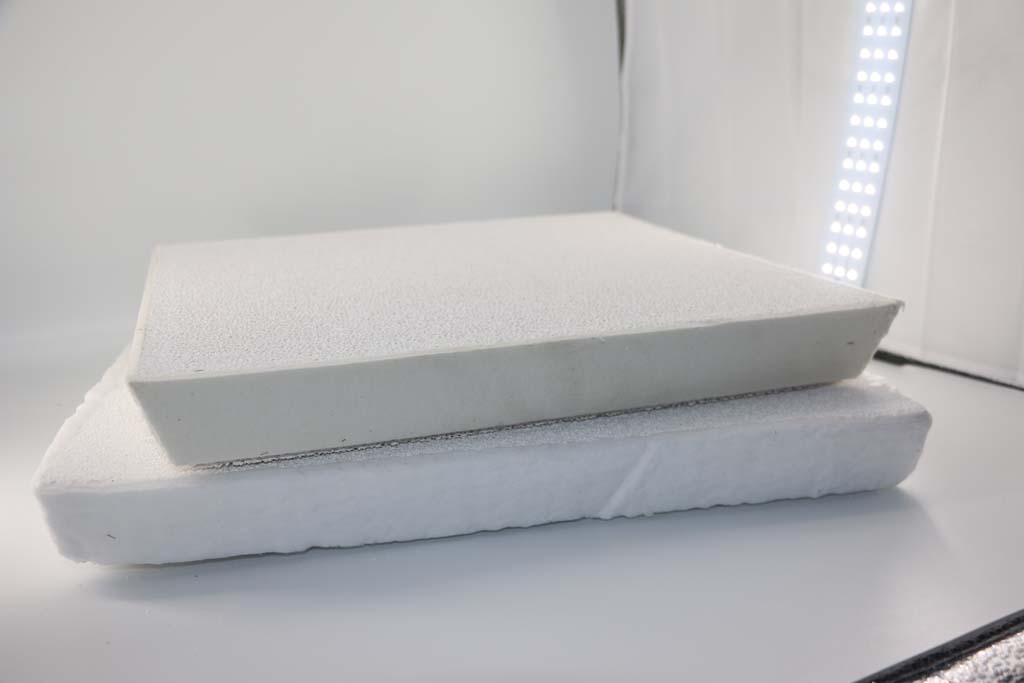During the use of ceramic foam filter online shopping in the aluminum factory, as a certain amount of metal melt passes through, a filter cake will be formed on the filter inlet surface, after which the flow rate of the melt through the filter will be significantly reduced.
On the one hand, due to the reduction of the inner diameter of the filter hole, the probability of small particle size inclusions being retained increases, and the removal efficiency of small particle size inclusions is improved.
On the other hand, due to the reduction of the cross-sectional area of the molten metal flow channel, the molten metal feed is blocked, and casting defects such as feed delay and shrinkage are prone to occur.
After the ceramic foam filter is used, the error correction effect of the ceramic foam filter can be fully demonstrated. The trickle of molten metal flows through the ceramic foam filter into the laminar flow of the main stream.
The laminar flow state of molten metal is smoothly filled, which avoids secondary oxidation and retention of molten metal, and effectively solves the cracks on the surface of the casting.
Ceramic Filter online shopping 30ppi 40ppi is the most commonly used ceramic foam filters in the aluminum casting industry.
Ordinary aluminum casting usually uses 10-40ppi ceramic filter plates.
Aviation and high-quality aluminum materials usually use 30-60ppi ceramic foam filter plates.
Ceramic foam filters are basically divided into 6 pore sizes: 10PPI, 15PPI, 20PPI, 25PPI, 30PPI, and 40PPI. The larger the number, the smaller the aperture. But in actual practice, the four types of 10PPI 20PPI 30PP 40PPI can meet the needs of customers.

Aperture selection
1. The casting: 10~25ppi
2. Semi-continuous casting: 30~60ppi
3. High-quality aluminum or sheet: 50~60ppi
4. Continuous casting and rolling: 50~60p
The layout of the molten metal CFF includes single-layer filtration and double-layer filtration.
Advantages of ceramic plate filter device
1. Low cost.
2. The alloy varieties are easy to replace.
3. Easy to install.
4. It occupies a small area and is easy to operate.
5. The impurity is greater than 10um, and the filtering effect is 95%.
Inclusions in the matrix affect the fracture process of aluminum alloy specimens
When the specimen is subjected to tensile force, severe concentrated stress appears at the front of the crack. When the tensile stress exceeds the yield strength, plastic deformation occurs first near the crack tip to form a plastic zone, which leads to stress relaxation and blunt crack tip.
As the plastic zone expands, the inclusions at the front end of the crack enter the plastic zone.
Due to the weak bonding force between the inclusions and the matrix, under the action of tensile stress, the inclusions are separated from the matrix to form initial micropores.
As the load continues to increase, the internal necking between the crack tip and the micro-holes intensifies, causing the crack tip and the micro-holes to gather quickly, and the cracks begin to expand forward.
Therefore, inclusions are conducive to the formation of initial micropores and have a greater impact on the propagation of cracks.
The wheel structure of aluminum alloy wheels largely determines the difficulty of low-pressure casting. The reason for the cracks on the surface of the casting is that during the filling process of the casting, the turbulent flow of the molten metal forms secondary oxidation and clamping, resulting in cracks and internal pores on the surface of the casting.
In order to avoid secondary oxidation and retention caused by the turbulent flow of molten metal, reduce the surface cracks and internal pores of the castings caused by this. After testing different models, different models, and different specifications of filters, Aluminum Indonesia finally chose the “20ppi” ceramic foam filter produced by AdTech.








